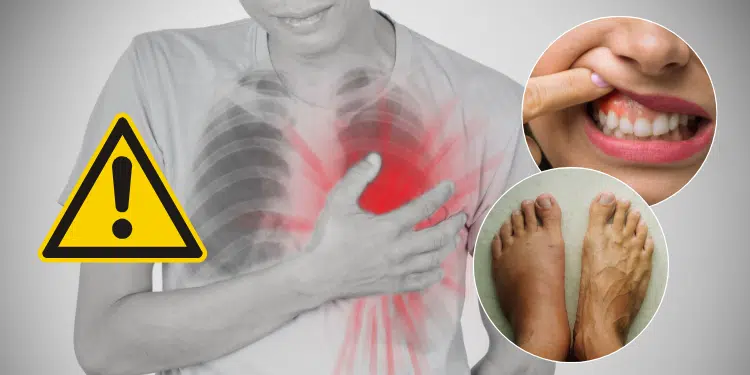Heart disease is often called a “silent killer” because it can develop without noticeable symptoms until it’s too late.
While chest pain and shortness of breath are well-known indicators, there are other, less obvious signs that could point to underlying heart issues.
Recognizing these unusual symptoms early can make a big difference in preventing serious complications.
Here are 11 strange and surprising signs of heart disease you should never ignore:
1. Swollen Feet or Ankles
Persistent swelling in your feet, ankles, or legs can indicate poor circulation due to a weakened heart. When the heart struggles to pump blood efficiently, fluid may accumulate in the lower extremities.
2. Fatigue That Won’t Go Away
Chronic fatigue can be an early sign of heart disease, especially in women. It may occur when your heart isn’t supplying enough oxygen-rich blood to your muscles and tissues.
3. Jaw or Neck Pain
Pain in your jaw, neck, or shoulders—especially on the left side—can be a sign of angina, a condition caused by reduced blood flow to the heart. It’s often mistaken for dental problems or muscle strain.
4. Nausea or Indigestion
Frequent nausea, indigestion, or stomach pain can sometimes signal heart problems. These symptoms are more common in women and are often overlooked as gastrointestinal issues.
5. Snoring or Sleep Apnea
Loud snoring or pauses in breathing during sleep can be linked to sleep apnea, which increases the risk of high blood pressure, arrhythmias, and other heart-related problems.
6. Dark Spots Under Nails
Unexplained red or brown streaks under your nails, known as splinter hemorrhages, can indicate tiny blood clots caused by bacterial endocarditis—a serious infection of the heart lining.
7. Difficulty Sleeping
Insomnia or frequent waking during the night could be linked to heart failure. Trouble breathing when lying flat is a particularly concerning symptom.
8. Gum Disease or Bleeding Gums
Research has shown a connection between gum disease and heart health. Chronic gum inflammation can contribute to the development of cardiovascular problems.
9. Cold Sweats
Breaking out in a cold sweat without an obvious cause, like physical exertion or heat, can be a sign of a heart attack. It’s often accompanied by dizziness or chest discomfort.
10. Erectile Dysfunction
For men, difficulty maintaining an erection can sometimes indicate poor blood flow due to narrowed or blocked arteries, which could be an early warning of heart disease.
When to Seek Medical Attention
If you notice any of these symptoms, don’t dismiss them as unrelated or insignificant. While they may have other explanations, it’s essential to rule out heart disease, especially if you have risk factors like:
- Family history of heart disease
- High blood pressure or cholesterol
- Diabetes
- Smoking or sedentary lifestyle
Preventing Heart Disease
While some risk factors are beyond your control, you can take proactive steps to protect your heart:
- Eat a Heart-Healthy Diet: Focus on fruits, vegetables, whole grains, lean proteins, and healthy fats.
- Stay Active: Aim for at least 150 minutes of moderate exercise per week.
- Manage Stress: Practice relaxation techniques like yoga, meditation, or deep breathing.
- Quit Smoking: Smoking significantly increases the risk of heart disease.
- Monitor Your Health: Regular checkups can help identify early warning signs and prevent complications.
Heart disease doesn’t always announce itself with dramatic symptoms.
Often, it whispers through strange, unexpected signs that can be easy to overlook.
By staying informed and vigilant, you can catch potential problems early and take steps to protect your heart health.
If you or a loved one experiences any of these symptoms, consult a doctor promptly. Your heart is worth it!

